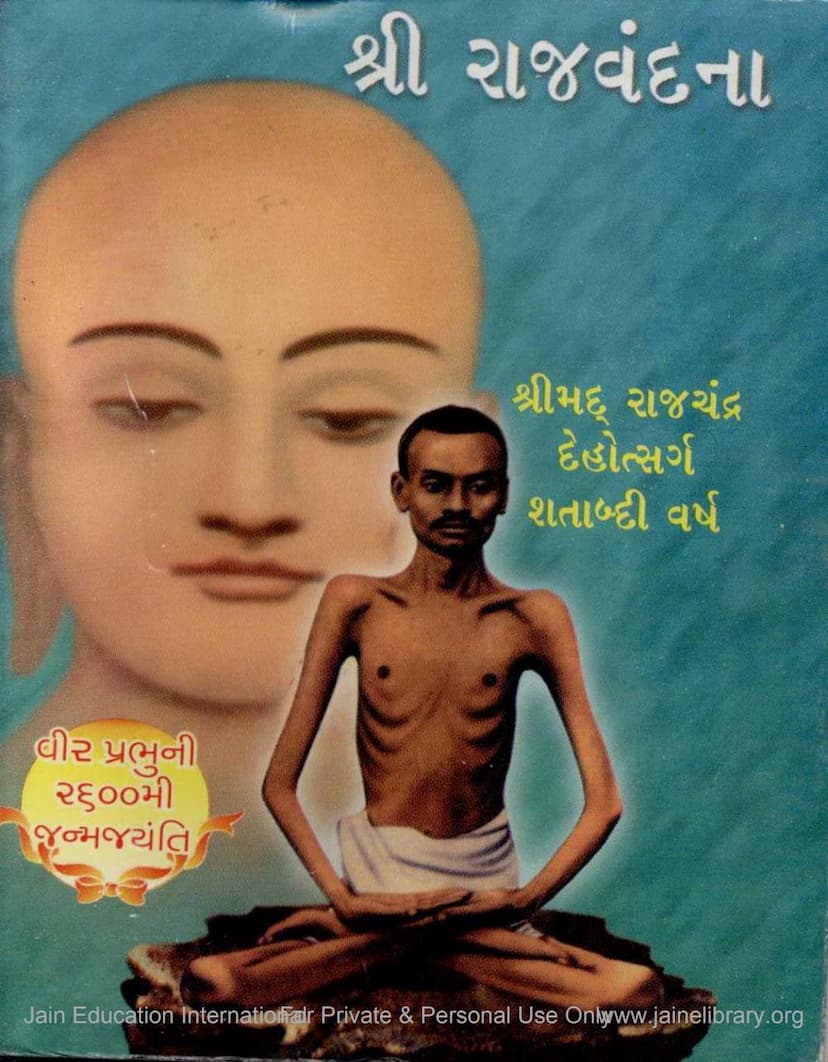Rajvandana
Added to library: September 2, 2025

Summary
This document is a compilation of devotional hymns, prayers, and philosophical teachings in Gujarati, titled "Rajvandana" (राजवंदना), authored by Atmanandji Maharaj and published by Shrimad Rajchandra Sadhna Kendra Koba. It is presented in the context of commemorating the Shrimad Rajchandra Dehottsarg Shatabdi Year (centenary of his departure from the physical body) and the 2600th birth anniversary of Lord Mahavir.
The book emphasizes the supreme importance of devotion (Bhakti) as a means to eradicate all vices, overcome ego, and follow the righteous path. It highlights that devotion practiced in the proximity of a great soul (prashasta purush) can lead to liberation (moksha) instantaneously.
The text includes a table of contents that outlines various sections, including:
- Sections on various philosophical concepts and practices: Such as Anityadi Bhavana (contemplation of impermanence), Atmasiddhi Shastra (scripture on soul-realization), and various aspects of spiritual practice.
- Devotional hymns and prayers: These are presented in various poetic meters (chhands) and address the divine. Specific prayers include morning and evening devotions (Pratahkal nu Devvandan, Sayankal nu Devvandana).
- Doharas (couplets): A collection of "Vish Dosra" (Twenty Doha) that express humility, repentance, and the realization of one's own shortcomings in spiritual practice, seeking divine grace.
- Teachings on "Kevalya Beej" (Seed of Omniscience): Likely referring to core Jain principles.
- Discussions on the nature of Jina's teachings: Emphasizing their profoundness, universal applicability, and ability to guide one across the ocean of worldly existence.
- Sections dedicated to specific Tirthankaras or guiding principles: Including references to Rishabhdev (Nabhinandan Nath) and Lord Shantinath.
- Discussions on the impermanence of worldly possessions and status: Illustrated through poems like "Kaal Koyne Nahi Muke" (Time spares no one), highlighting that even kings and opulent individuals are subject to the passage of time.
- Emphasis on Dharma (righteous conduct) as the ultimate value: Many sections stress that without Dharma, all worldly achievements and pleasures are meaningless.
- The concept of "Sarvamanya Dharma" (Universal Dharma): Defining it as embodying non-violence, truth, charity, compassion, and contentment.
- The path of devotion (Bhakti Marg): Describing it as a path to achieve desired fruits and inner peace.
- Teachings on Brahmacharya (celibacy): Emphasizing its role in spiritual progress and control over desires.
- Discussions on "Amulya Tattva Vichar" (Priceless Philosophical Reflections): Pondering the nature of the self, suffering, and the path to liberation.
- Various Bhavanas (contemplations): Such as Asharan Bhavana (contemplation of being without refuge), Ekatva Bhavana (contemplation of oneness), Anyatva Bhavana (contemplation of otherness), and Ashuchi Bhavana (contemplation of impurity).
- The importance of the Guru: Numerous verses highlight the Guru's role in revealing the true self, guiding towards liberation, and dispelling ignorance. The Guru is portrayed as the true source of knowledge, devotion, and salvation.
- The Six Principles (Chh Pad): These are elaborated upon as foundational tenets for right faith (Samyak Darshan), covering the existence, eternality, agency, experience, liberation, and the path to liberation of the soul. The text engages in a dialogue between a disciple (Shishya) and Guru (Sadguru) to clarify doubts related to these principles.
- The importance of Right Faith (Samyak Darshan): Described as the abode of the six principles, leading to self-realization and liberation.
Throughout the book, there is a consistent theme of renunciation, self-control, the pursuit of spiritual knowledge, and unwavering devotion to the Tirthankaras and the Guru. The author, Atmanandji Maharaj, draws heavily from the teachings of Shrimad Rajchandra, a revered Jain philosopher and spiritual guide. The book aims to inspire spiritual seekers towards a life of righteousness, detachment, and ultimate liberation.